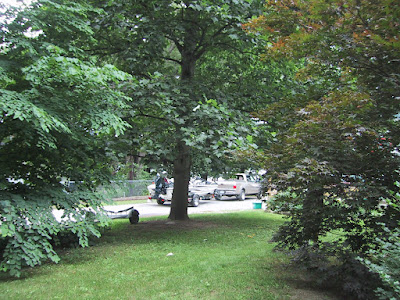Disgusting! Like something out of an old horror movie! Devastating! Check out this invasive algae which attacks rivers and streams. I don't know how or if lakes can be effected.
(Thanks to the MPA Board member who passed this along to me!)

"The New Hampshire Department of Environmental Services has issued an alert that the invasive algae “Didymosphenia geminate” also known as “rock snot” or “didymo” has been found along the northern reaches of the Connecticut River as well as in the White River near Bethel, Vermont. A local fishing guide discovered the invasive alga which was later confirmed by the Vermont Natural Resources Agency. This is the first positive identification of the algae in the northeastern region of the United States.
Because of its extremely invasive nature and the close proximity of the findings to New Hampshire, it is imperative that scientists and experts from across the region address the threat of further spreading of the algae into other waterways. According to the Environmental Protection Agency, this alga is the only freshwater diatom to exhibit large scale invasive behavior. It impacts infested water bodies significantly with the ability to alter food web structure as well as the hydraulics of streams and rivers.
In other rivers that have been invaded by “didymo”, there have been accounts of large blooms forming thick mats of cottony material on stream and river bottoms. The mats can suffocate aquatic plants and obliterate fish habitat. Dense mats of didymo can harm populations of aquatic insects which form an important source of food for fishes including trout.
“The devastation to the habitat of our New Hampshire streams and rivers by Didymo may be as destructive as exotic milfoil is to our lakes and ponds,” said Jody Connor DES Limnology Center Director. “New Hampshire Biologists are extremely concerned and taking the threat of the spread of Didymo to our rivers and streams very seriously.”
There is currently no way to control or eliminate didymo which is why the prevention of further spread of the algae is imperative. According to Steve Couture DES Rivers Coordinator, “this invasive diatom could have potentially significant ecological impacts to New Hampshire’s invaluable riverine resources.” DES wants to stress that the following precautions must be adhered to by all recreationalists, such as anglers and paddlers, to help stop the spread of Didymo to other steams and rivers:

* Check: Before leaving a river or stream, remove all visible clumps of algae and look for hidden clumps. Leave them at the site. If you find any later, don't wash them down drains. Put all material in the trash.
* Clean: Soak and scrub all items for at least one minute in hot water (140 degrees F), or use a 2 percent bleach solution or a 5 percent solution of salt, antiseptic hand cleaner or dishwashing detergent.
* Dry: If cleaning is not practical, after the item is completely dry to the touch, wait an additional 48 hours before letting it contact any other waterway."
The photos are courtesy of New Zealand. For more information on what you can do to prevent, or to track its spread/arrest, check out these sites.
http://www.epa.gov/region8/water/didymosphenia/
http://www.des.state.nh.us/press/archive/2007/press07112007.htm
http://www.nzfishing.com/Other/BiosecurityWhatToDo.htm
http://www.mainehuntingtoday.com/bbb/?p=2330
http://reel-time.com/forum/showthread.php?p=209328








